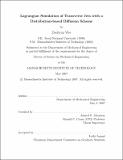| dc.contributor.advisor | Ahmed F. Ghoniem. | en_US |
| dc.contributor.author | Wee, Daehyun, 1974- | en_US |
| dc.contributor.other | Massachusetts Institute of Technology. Dept. of Mechanical Engineering. | en_US |
| dc.date.accessioned | 2008-02-27T20:35:24Z | |
| dc.date.available | 2008-02-27T20:35:24Z | |
| dc.date.copyright | 2007 | en_US |
| dc.date.issued | 2007 | en_US |
| dc.identifier.uri | http://hdl.handle.net/1721.1/40290 | |
| dc.description | Thesis (Sc. D.)--Massachusetts Institute of Technology, Dept. of Mechanical Engineering, 2007. | en_US |
| dc.description | This electronic version was submitted by the student author. The certified thesis is available in the Institute Archives and Special Collections. | en_US |
| dc.description | Includes bibliographical references (leaves 248-255). | en_US |
| dc.description.abstract | Transverse jets form a dominant group of flow fields arising in many applications of modern energy utilization, including propulsion and effluent dispersion. Furthermore, they form canonical examples where the flow field is dominated by large-scale and small-scale vortical structures, whose inter-related dynamics is a challenging subject in modern fluid mechanics. This study seeks a mechanistic understanding of the vortical structures of the transverse jet and their evolution. A set of massively parallel three-dimensional vortex simulations of high-momentum transverse jets at intermediate Reynolds number, utilizing a discrete filament representation of the vorticity field to capture stretching and tilting of vorticity, is performed. A diffusion scheme to treat viscosity at intermediate Reynolds number is formulated and analyzed in a distribution-based description. The implementation of the diffusion scheme is achieved by performing interpolation, which is a process that has been widely used to regularize particle distributions in vortex simulations, with a new set of interpolation kernels. These kernels provide an accurate and efficient way to simulate vorticity diffusion in transverse jets. An improved formulation of the vorticity flux boundary conditions is rigorously derived. | en_US |
| dc.description.abstract | (cont.) This formulation includes separation of the wall boundary layer and feedback from the jet to the wall boundary layer, and describes detailed near-field jet structures. The results present the underlying mechanisms by which vortical structures evolve. Transformation of the jet shear layer emanating from the nozzle starts with jet streamwise lift-up of its lee side to form sections of counter-rotating vorticity aligned with the jet trajectory. Periodic rollup of the shear layer, which is similar to the Kelvin-Helmholtz instability in free shear layers, accompanies this deformation. A sudden breakdown of these coherent structures into dense vortical structures of smaller scales is observed. This breakdown to small-scale structures is due to the interaction of counter-rotating vortices and rolled-up shear layer. With a separated wall boundary layer, strong near-wall counter-rotating vortices are observed. This observation substantiates the importance of including the full interaction between the wall boundary layer and the jet shear layer in the investigation of transverse jet dynamics. | en_US |
| dc.description.statementofresponsibility | by Daehyun Wee. | en_US |
| dc.format.extent | 255 leaves | en_US |
| dc.language.iso | eng | en_US |
| dc.publisher | Massachusetts Institute of Technology | en_US |
| dc.rights | M.I.T. theses are protected by copyright. They may be viewed from this source for any purpose, but reproduction or distribution in any format is prohibited without written permission. See provided URL for inquiries about permission. | en_US |
| dc.rights.uri | http://dspace.mit.edu/handle/1721.1/7582 | |
| dc.subject | Mechanical Engineering. | en_US |
| dc.title | Lagrangian simulation of transverse jets with a distribution-based diffusion scheme | en_US |
| dc.type | Thesis | en_US |
| dc.description.degree | Sc.D. | en_US |
| dc.contributor.department | Massachusetts Institute of Technology. Department of Mechanical Engineering | |
| dc.identifier.oclc | 190825587 | en_US |
